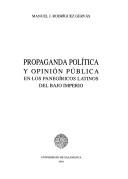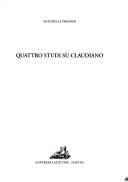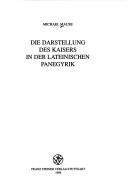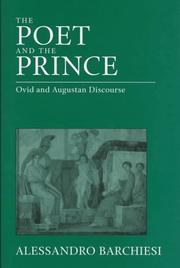| Listing 1 - 10 of 49 | << page >> |
Sort by
|
Book
Year: 1971 Publisher: Heidelberg : Winter Verlag,
Abstract | Keywords | Export | Availability | Bookmark
 Loading...
Loading...Choose an application
- Reference Manager
- EndNote
- RefWorks (Direct export to RefWorks)
Political poetry, Latin --- Politics and literature --- History and criticism. --- Horace. --- Horace --- Political and social views.
Book
Year: 1956 Publisher: Heidelberg : Winter,
Abstract | Keywords | Export | Availability | Bookmark
 Loading...
Loading...Choose an application
- Reference Manager
- EndNote
- RefWorks (Direct export to RefWorks)
Political poetry, Latin --- Politics and literature --- History and criticism. --- Horace --- Political and social views.
Book
Year: 1678 Publisher: [London : s.n.,
Abstract | Keywords | Export | Availability | Bookmark
 Loading...
Loading...Choose an application
- Reference Manager
- EndNote
- RefWorks (Direct export to RefWorks)
eebo-0113
Book
Year: 1982 Publisher: Milano : Vita e pensiero,
Abstract | Keywords | Export | Availability | Bookmark
 Loading...
Loading...Choose an application
- Reference Manager
- EndNote
- RefWorks (Direct export to RefWorks)
Political poetry, Latin --- Politics and literature --- History and criticism. --- Horace --- Political and social views. --- Rome --- In literature.
Book
Year: 1961 Publisher: Köln : Böhlau,
Abstract | Keywords | Export | Availability | Bookmark
 Loading...
Loading...Choose an application
- Reference Manager
- EndNote
- RefWorks (Direct export to RefWorks)
Latin poetry --- Political poetry, Latin --- Politics and literature --- History and criticism. --- History and criticism. --- Augustus, --- Influence. --- Rome --- History
Book
ISBN: 0801466938 Year: 1993 Publisher: [Place of publication not identified] Cornell University Press
Abstract | Keywords | Export | Availability | Bookmark
 Loading...
Loading...Choose an application
- Reference Manager
- EndNote
- RefWorks (Direct export to RefWorks)
Informal in tone and seemingly effortless in movement, Horace's Epistles have haunted and delighted readers for two millennia. W. R. Johnson offers an extraordinarily suggestive new interpretation of Book 1 of the Epistles, an interpretation not only of the poems but of the poet they reveal.Johnson regards the Epistles as the fruit of the poet's search for freedom, clarity of perception, and inner harmony in a complex society. He portrays Horace as a paradoxical combination of sophist and gardener, working both nature and culture within a terrain bounded on the one side by chaos and on the other by technocracy. Resisting any linear, progressive reading, he traces the key themes in the poems, such as Horace's relationships with his father and with Rome, his adoptive city, and the conflicts between urban vitality and rustic serenity and between inner freedom and outer freedom. While in the end Johnson maintains that the Epistles uphold the possibility that the individual can achieve a dynamic balance of heart and soul, he demonstrates that what nourishes the poems are the suffering and fear, resentment and anger that underlie their carefully controlled surface. Horace and the Dialectic of Freedom will engage and challenge classicists, students of Latin literature, and others interested in satire and in the history of poetry.
Epistolary poetry, Latin --- Political poetry, Latin --- Liberty in literature --- Dialectic --- History and criticism --- Horace. --- Rome --- In literature.

ISBN: 8474816661 Year: 1991 Publisher: Salamanca Universidad de Salamanca
Abstract | Keywords | Export | Availability | Bookmark
 Loading...
Loading...Choose an application
- Reference Manager
- EndNote
- RefWorks (Direct export to RefWorks)
Laudatory poetry, Latin --- Political poetry, Latin --- Politics and literature --- Propaganda, Roman --- Public opinion --- History and criticism --- Rome --- Politics and government

ISBN: 8880969544 Year: 2003 Publisher: Napoli Loffredo
Abstract | Keywords | Export | Availability | Bookmark
 Loading...
Loading...Choose an application
- Reference Manager
- EndNote
- RefWorks (Direct export to RefWorks)
Political poetry, Latin --- Politics and literature --- History and criticism --- Claudianus, Claudius --- Criticism and interpretation. --- Rome --- History --- Historiography.

ISBN: 3515066292 9783515066297 Year: 1994 Volume: 50 Publisher: Stuttgart Steiner
Abstract | Keywords | Export | Availability | Bookmark
 Loading...
Loading...Choose an application
- Reference Manager
- EndNote
- RefWorks (Direct export to RefWorks)
Classical Latin literature --- Literary rhetorics --- Laudatory poetry, Latin --- Political poetry, Latin --- Politics and literature --- Emperors in literature --- History and criticism --- Rome --- In literature --- -Political poetry, Latin --- -Politics and literature --- -Literature --- Literature and politics --- Literature --- Latin political poetry --- Latin poetry --- Latin laudatory poetry --- Political aspects --- In literature. --- -History and criticism --- Laudatory poetry, Latin - History and criticism --- Political poetry, Latin - History and criticism --- Politics and literature - Rome --- Rome - In literature

ISBN: 0520202236 9780520202238 Year: 1997 Publisher: Berkeley (CA) : University of California Press,
Abstract | Keywords | Export | Availability | Bookmark
 Loading...
Loading...Choose an application
- Reference Manager
- EndNote
- RefWorks (Direct export to RefWorks)
Rome -- Dans la littérature --- Rome -- In de literatuur --- Rome -- In literature --- Rome dans la littérature --- Rome in de literatuur --- Rome in literature --- Political poetry, Latin --- Politics and literature --- History and criticism. --- Ovid, --- Augustus, --- Political and social views. --- Influence. --- Rome --- History --- In literature. --- Ovid --- Political and social views --- Political poetry [Latin ] --- History and criticism --- Augustus --- Augustus, 30 B.C.-14 A.D. --- Political poetry, Latin - History and criticism. --- Politics and literature - Rome.
| Listing 1 - 10 of 49 | << page >> |
Sort by
|

 Search
Search Feedback
Feedback About UniCat
About UniCat  Help
Help News
News